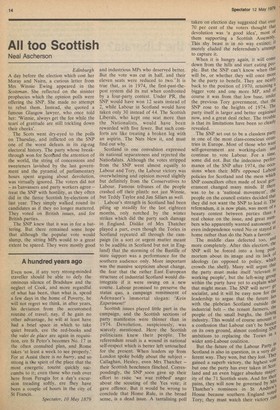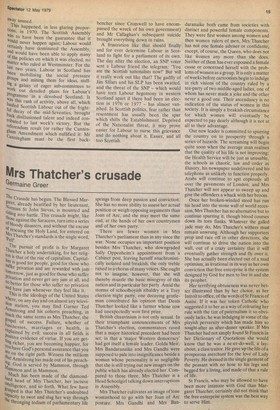All too Scottish
Neal Ascherson
Edinburgh A day before the election which cost her Moray and Nairn, a curious letter from Mrs Winnie Ewing appeared in the Scotsman. She reflected on the sinister prophecies which the opinion polls were offering the SNP. She made no attempt to rebut them. Instead, she quoted a famous Glasgow lawyer, who once told her: 'Winnie, always get the fee while the tear g of gratitude are still trickling down their cheeks'.
The Scots went dry-eyed to the polls on Thursday, and inflicted on the SNP one of the worst defeats in its zig-zag electoral history. The party whose breakthrough won for Scotrand the attention of the world, the string of concessions and sweeteners lavished by the last government and the pyramid of parliamentary hours spent arguing about devolution, was virtually ignored. The voters did not — as t anvassers and party workers agree — treat the SNP with hostility, as they often did in the fierce Scottish by-elections of last year. They simply walked round its candidates as if they no longer mattered. They voted on British issues, and for British parties.
The SNP knew that it was in for a battering. But there remained some hope that although the popular vote would slump, the sitting MPs would to a great extent be spared. They were mostly good and industrious MPs who deserved better. But the vote was cut in half, and their eleven seats were reduced to two:It is true that, as in 1974, the first-past-thepost system did its nut when confronted by a four-party contest. Under PR, the SNP would have won 12 seats instead of 2, while Labour in Scotland would have taken only 30 instead of 44. The Scottish Liberals, who kept one seat more than the Nationalists, would have been rewarded with five fewer. But such comforts are like treating a broken leg with an aspirin. The Nats blew it, and must find out why.
Scotland in one convulsion expressed its national separateness and rejected the Nationalists. Although the votes stripped from the SNP went almost equally to Labour and Tory, the Labour victory was overwhelming and opinion moved slightly but definitely from the Conservatives to Labour. Famous tribunes of the people crashed off their plinth: not just Winnie, but Teddy Taylor and Jim Sillars as well.
Labour's strength in Scotland had been piling up steadily for the last eighteen months, only notched by the winter strikes which did the party such damage in England. Dislike of Mrs Thatcher played a part, even though the Tories in Scotland repeated all through the campaign (in a sort or urgent mutter meant to be audible in Scotland but not in England) that the storming of the Bastille of state support was a performance for the southern audience only. More important was the massive scepticism about change, the fear that the rather East European structure of industrial Scotland would disintegrate if it were swung on a new course. Labour promised to preserve the status quo, a campaign reminiscent of Adenauer's immortal slogan: `Kein Experiment!'
Scottish issues played little part in the campaign, and the Scottish sections of party manifestos were thinner than in 1974. Devolution, suspiciously, was scarcely mentioned. Here the Scottish politicians knew their people. The referendum result is a wound in national self-respect which is better left untouched for the present. When leaders up from London spoke boldly about the subject — Callaghan, Healey, even Mrs Thatcher — their Scottish henchmen flinched. Correspondingly, the SNP ,soon gave up their effort to raise 'we wuz robbed' anger about the scouting of the Yes vote; it gave offence. But it would be wrong to conclude that Home Rule, in the broad sense, is a dead issue. A tantalising poll taken on election day suggested that over 70 per cent of the voters thought that devolution was 'a good idea', most of them supporting a Scottish Assembly. This shy beast is in no way extinct; it merely eluded the referendum's attempt to capture it.
When it is hungry again, it will conic down from the hills and start eating people. But the SNP can't know when that will be, or whether they will once more be the party to benefit. They are nearly back to the position of 1970, retaining a bigger vote and one more MP, and Of course it was from that low base, under the previous Tory government, that the SNP rose to the heights of 1974. The party itself is larger and better organise° now, and a great deal richer. The trouble is that its limitations have been so clearlY revealed.
The SNP set out to be a classless party in one of the most class-conscious coontries in Europe. Most of those who wallt, self-government are working-class an° continue to vote Labour. For a time' some did not. But the indecisive performance of the SNP after 1974, the °ea' sions when their MPs opposed Labour policies for Scotland and the mess which SNP councillors often made of local goy' ernment changed many minds. If there was to be a 'national movement', the people on the council estates decided that they did not want the SNP to lead it. The referendum, it is now plain, was more a a beauty contest between parties than 3 real choice on the issue, and great nuln" bers who apparently wanted autonomy or even independence voted No or stayed at home rather than do the Nats a favour.
The middle class defected too, attLI more completely. After this election, the SNP will be forced into a long Post; mortem about its image and its lack c" ideology (as opposed to policy, which crowds the shelf). Many will argue that the party must make itself 'relevant 0) working people', but the left-wing gr°tIPt within the party have yet to explain wha that might mean. The SNP will neve' g° socialist, and it will be easy now for the leadership to argue that the future lies with the plebeian Scotland outside the industrial belt — the tenant farmers, the people of the small burghs, the fishing industry. This would of course amount t° a confession that Labour can't be beater° on its own ground, almost confining SN ambitions to replacing the Tories in 3 wider anti-Labour coalition. But the future of the Labour Party it: Scotland is also in question, in a very citt. ferent way. They won, but they lost. TheY gained a superb victory, the highest vote but one the party has ever taken in Scot' land and an even bigger absolute illaj°/:; ity of the 71 Scottish seats. And for thels pains, they will now be governed by Mr,s Thatcher's nominees in St Andrew d House because southern England vote t Tory; they must watch their victory rus away unused. This happened, in less glaring Proportions, in 1970. The Scottish Assembly was to have been the guarantee that it Would never happen again; Labour would certainly have dominated the Assembly, and would have been able to apply many Of the policies on which it was elected, no matter who ruled at Westminster. For the last two years, Labour in Scotland has been mobilising the social pressure groups and mining them for ideas, staffing a galaxy of eager sub-committees to work out detailed plans for Labour's programme in a devolved Scotland. It was this rush of activity, above all, which hauled Scottish Labour out of the frightful decay of the mid-Seventies, brought back disillusioned talent and indeed contributed to last week's victory. But the referendum result (or rather the Cunningham Amendment which nullified it: Mr Cunningham must be the first back bencher since Cromwell to have encompassed the wreck of his own government) and Mr Callaghan's subsequent suicide brought everything down in ruins.
A frustration like that should finally and for ever determine Labour in Scotland to fight for a parliament of its own. The day after the election, an SNP voter sent a Labour friend the telegram: 'You are the Scottish nationalists now!' But will it really work out like that? The gadfly of Jim Sillars and his SLP has been swatted, and the threat of the SNP — which would have torn Labour hegemony in western Scotland apart if there had been an election in 1976 or 1977 — has almost vanished. In Scottish politics, fear rather than resentment has usually been the spur which shifts the Establishment. Deprived of the Nationalist threat, it may prove easier for Labour to nurse this grievance and do nothing about it. Easier, and all too Scottish.



































 Previous page
Previous page